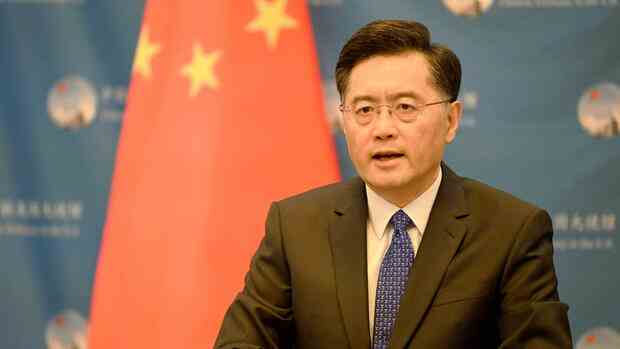Qin previously worked as a spokesman for the Chinese Foreign Ministry.
(Photo: imago images/VCG)
Beijing China’s former ambassador to the United States, Qin Gang, will become the new foreign minister of the People’s Republic. The 56-year-old replaces Wang Yi, who has held the post for the past ten years, Chinese state broadcaster CCTV reported on Friday.
Qin is seen as a confidant of China’s powerful head of state and party leader Xi Jinping, from 2014 to 2018 he was his chief of protocol. He was only appointed Chinese ambassador to Washington in mid-2021.
Qin previously served as China’s vice foreign minister. He is considered a hardliner. During his two terms as spokesman for the Chinese Foreign Ministry, he regularly attacked journalists for critical questions.
As in the past, one of the most important issues for the new foreign minister will be the tense relationship between Washington and Beijing. In an opinion piece for the magazine “National Interest” he recently outlined the main features of Chinese foreign policy – and struck a thoroughly conciliatory tone with regard to the relationship with the USA. “China-US relations should not be a zero-sum game, with one side trumping the other or thriving at the expense of the other,” he wrote. China and the United States today have “more common interests, not less.”
Top jobs of the day
Find the best jobs now and
be notified by email.
>> Also read: Comment: China’s corona easing seems hasty and ill-prepared
Tensions, not only in the Chinese-American relationship, but also in the relationship between Beijing and Europe, are caused by the fact that the Chinese government remains firmly on Moscow’s side, despite Russia’s atrocities in the Ukraine war.
As early as February 4, the autocratic leaders had sworn to each other a “friendship without borders”. In a video call on Friday, Xi and Russian President Vladimir Putin agreed to deepen their military cooperation.
Human rights violations are “anti-terrorist measures” for him
Qin is fully in line with Beijing. He does not describe the Russian war of aggression as such, but alternatively as an “affair” or “crisis”. He dismisses the serious human rights violations that the Chinese leadership in the western Chinese province of Xinjiang is accused of as “anti-terrorist measures” and the pro-democracy protests in Hong Kong as controlled by “anti-China forces”.
China has repeatedly threatened in recent months that it reserves the right to use force against Taiwan.
(Photo: dpa)
Qin sees the conflict over Taiwan as the “most sensitive and important core issue in relations between China and the United States”. Beijing considers the island part of its territory, even though it has never been part of the People’s Republic founded in 1949, has its own democratically elected government and laws, and polls by Taiwanese people have repeatedly indicated that they are opposed to a merger with China.
In recent months, the Chinese government has repeatedly threatened to reserve the right to use force against Taiwan. The Chinese army is conducting increasingly daring military maneuvers in the region.
Qin attributes the cause of the rising tensions to the behavior of the US and the Taiwanese government, he said at an event in mid-2022.
China’s former Foreign Minister Wang Yi will continue to shape the international relations of the People’s Republic. The 69-year-old was promoted to the Communist Party’s Politburo in October, where he is expected to assume a greater role in foreign policy issues.
More: Little room for maneuver for politics: The federal government is faced with a China dilemma
